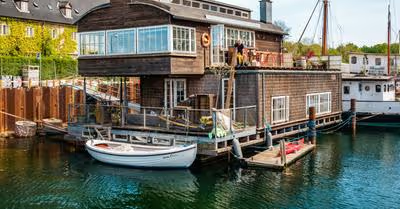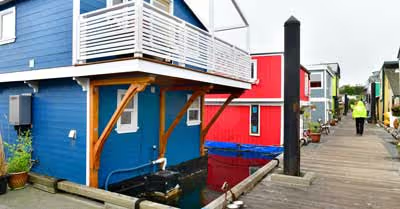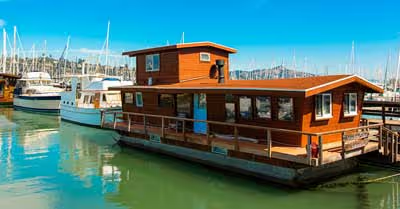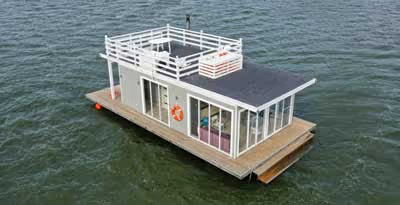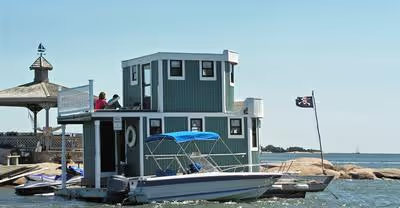
Key Takeaways
- Houseboat loans offer specialized financing for the unique needs of marine lifestyles.
- Unsecured loans may be riskier due to higher interest rates.
- Marine lenders provide expertise in boat financing and competitive loan terms.
- Houseboat communities provide financial benefits to their members.
Owning a houseboat is exciting, and you’re probably looking to finance a houseboat! Well, let’s uncover a few ways to finance your houseboat seamlessly.
You can finance your houseboat through houseboat loans, personal loans, marine lenders, or home equity lines. You can also finance it through credit union loans, online lenders, or manufacturer loans. These loans can adapt to whether the houseboat is your vacation spot or your primary residence.
My extensive background in marine financing equips me with the insights needed to help you navigate various financing options and secure the keys to your dream houseboat. I've assisted numerous individuals in making their maritime dreams a reality, and I'm here to share my expertise, ensuring that your houseboat financing journey is successful.
How to Finance Houseboat
Embarking on the journey of owning a houseboat is a thrilling prospect, offering the promise of picturesque waterside living and endless adventures. Yet, before you can sail away into the horizon, there's a crucial decision to make: how to finance your dream houseboat.
With a sea of options available, it's imperative to navigate the waters wisely and choose the financing solution that best suits your needs and circumstances. To choose the best option, there are essential factors to consider.
- Budget and Affordability: Establish a clear budget that encompasses the purchase price and ongoing expenses like maintenance and mooring fees, ensuring your houseboat dream aligns with your financial reality.
- Down Payment: Evaluate the down payment required by your chosen financing option, considering how a larger down payment can reduce monthly payments and overall interest costs while also maintaining a comfortable savings cushion.
- Repayment Plan: Decide between a fixed-rate loan with predictable monthly payments or a variable-rate loan with potential rate fluctuations, aligning your choice with your risk tolerance and financial goals.
Now that we've laid the groundwork by examining the essential considerations for financing your houseboat, it's time to set sail into the diverse world of financing options available to make your waterfront dreams a reality. We'll navigate through various options, each offering its unique advantages and intricacies.
Houseboat Loans
Houseboat loans are an excellent choice for those looking to finance their aquatic abode. Unlike generic loans, houseboat loans are designed with the unique needs of marine enthusiasts in mind. They often provide extended loan terms, allowing for manageable monthly payments.
Additionally, these loans may factor in the potential resale value of your houseboat, offering you a financing solution that aligns with the vessel's long-term worth.
These loans also typically cover various aspects of houseboat ownership, including the purchase price, insurance, and even some ongoing maintenance costs.
It's crucial to shop around and compare loan offers from different lenders specializing in marine financing to secure the best terms for your unique houseboat investment.
Personal Loans
Using personal loans for houseboat financing is another option, albeit often with higher interest rates than secured loans. If you have strong credit and sufficient income, you might find a personal loan to be a suitable financing method.
Personal loans provide flexibility in how you use the funds, making them an attractive choice for houseboat purchases. However, it's essential to note that personal loans are typically unsecured, meaning they don't require collateral.
As a result, they often come with higher interest rates compared to secured loans, such as houseboat loans or home equity lines.
Before opting for a personal loan, ensure that your creditworthiness is in good standing, as this can impact your ability to secure favorable terms and lower interest rates.
Additionally, consider your financial situation carefully to determine whether the higher interest rates associated with personal loans align with your budget and long-term financial goals. You can apply for a personal loan from the U.S. Bank.
Marine Lenders
Marine lenders offer boat loans and understand the specific requirements and details of funding a marine vessel like a houseboat. They often provide competitive and typical boat loan terms catered to the marine industry.
One of the key advantages of working with marine lenders is their competitive loan terms. They often provide competitive interest rates, extended loan periods, and flexibility in structuring your loan to align with your financial situation.
This expertise can result in more favorable loan terms compared to generic lenders who may not fully comprehend the intricacies of boat financing.
When considering marine lenders, it's essential to research and compare offers from different providers. By doing so, you can ensure that you secure the most advantageous loan terms that suit your budget and houseboat aspirations.
Home Equity Lines
If you own a home, you might consider using a home equity line or home equity loans to finance your houseboat. This method can be cost-effective since these loans typically have lower interest rates.
Leveraging your home equity through a home equity line of credit (HELOC) or a home equity loan can be an efficient and cost-effective way to finance your houseboat. These options are particularly attractive if you've built up substantial equity in your home.
Home equity loans typically offer lower interest rates compared to unsecured loans because they are secured by the value of your home.
Before utilizing your home equity, it's important to assess the potential risks. Since your home serves as collateral, defaulting on the loan can put your home at risk. Therefore, it's crucial to ensure that you have a stable financial situation and the ability to manage the repayment of the home equity loan or HELOC.
Credit Unions
Credit unions can be a valuable resource for securing financing for your houseboat. These member-owned financial cooperatives often prioritize the needs of their members and may offer competitive loan rates and favorable terms.
If you are a member of a credit union, you may find that they are more willing to consider houseboat financing compared to larger, traditional banks.
Before approaching a credit union for houseboat financing, it's important to become a member if you aren't already. Each credit union has its membership requirements, which may involve living or working in a specific area or belonging to a particular organization.
Once you become a member, you can explore the financing options they offer for your houseboat purchase.
Online Lenders
Online lenders have revolutionized the lending industry by offering convenience, flexibility, and efficiency in securing loans, including those for houseboats. These digital lenders often provide a streamlined application process, quick approval times, and competitive interest rates.
This can be particularly advantageous if you're looking to secure financing promptly and prefer the convenience of online transactions.
One of the key benefits of online lenders is their ability to cater to a wide range of borrowers, including those with varying credit profiles. While traditional lenders may have stricter eligibility criteria, online lenders may offer more flexible options, making them accessible to a broader audience.
When considering online lenders for houseboat financing, it's essential to research and compare offers from different providers. Pay close attention to interest rates, loan terms, and any associated fees to ensure that you secure a loan that aligns with your financial goals and requirements.
Manufacturer or Dealer Financing
Manufacturer or dealer financing can be a convenient and potentially cost-effective way to finance your houseboat purchase.
Houseboat manufacturers and dealers often partner with financial institutions or lending institutions to offer financing options to their customers. This arrangement can provide several advantages for buyers.
One significant advantage is the convenience of one-stop shopping. When you finance your houseboat through the manufacturer or dealer, you can often handle both the purchase and financing aspects at the same location. This streamlined process can save you time and effort.
Additionally, manufacturer or dealer financing may come with promotional financing rates or incentives that can result in cost savings. These promotions can include lower interest rates, extended loan terms, or reduced down payment requirements.
It's essential to inquire about any current promotions or special offers when exploring this financing option.
Requirements for Houseboat Loans
Qualifying for a houseboat loan requires understanding the different requirements from lenders. Most will look into your credit history, your current employment, and your ability to repay the loan.
It's more than just picking out your dream boat; it's about ensuring your financial ducks are in a row.
Here's a breakdown of what lenders typically want to see:
Nailing this is critical because lenders want to minimize their risk and ensure that you can comfortably make payments on your houseboat. Every element here is a piece of the puzzle that helps you get closer to that dream of houseboat living.
Loan Approval Process
Securing funding for a houseboat combines elements of home and boat financing, each with its unique considerations. I’ll guide you through the essential steps of the loan approval process in order to make your dream of houseboat ownership a reality.
Understanding the approval process for a houseboat loan is the first anchor you need to drop. The clock starts ticking the moment you submit your loan application.
Lenders will scrutinize your financial background, including your credit history, income, and existing debts. They will determine your creditworthiness and the risk they'd take by granting you a loan amount that aligns with the purchase price of the houseboat.
Understand Loan Rates and Terms
Next up are the loan rates and terms, which can be thought of as the rudder guiding your financial journey. These will dictate your monthly payment and the total cost over the life of the loan.
Expect higher interest rates compared to traditional mortgages since houseboats are considered non-standard securities for lenders. Pay attention to:
- High-interest rates
- Terms and monthly payments
- Impact on long-term financial commitment
Prepare the Financial Documents
Lastly, readying your financial documents is essential to preparing for a voyage. Lenders will ask for bank statements, proof of income, tax returns, and possibly a second mortgage if you're tapping into home equity.
Having these documents at hand will not only speed up the process but also increase your chances of a favorable loan offer.
- Gather bank statements and proof of income
- Organize tax returns
- Consider second mortgage documents if applicable
By following these steps and preparing thoroughly, you’ll set the sails for a successful houseboat financing journey.
Cost Considerations for Houseboat Loans
When considering the purchase of a houseboat, it's essential to weigh both the initial investment and the ongoing financial responsibilities. Prospective houseboat buyers often focus on the upfront costs but tend to underestimate the recurring expenses that can accumulate.
I've come to realize that the allure of living on the water comes with its own set of unique financial considerations. If you're a potential boat owner, it's important to prepare for the upfront costs associated with purchasing a houseboat, which go beyond the sticker price.
Initial expenses often include a down payment, sales tax, registration fees, and possibly a marine survey. Additionally, outfitting your houseboat with necessary amenities and safety equipment can add to the total cost.
But the expenses don't stop at the purchase. As a houseboat owner, you'll have regular ongoing expenses such as:
- Moorage fees: These are the costs to dock your houseboat at a marina or slip, and they can vary widely based on the location and services provided.
- Fuel costs: Depending on how often you plan to navigate your houseboat, fuel can be a significant monthly expenditure.
- Maintenance: Houseboats, like any home, need repairs and maintenance, which can include mechanical upkeep, painting, and servicing onboard systems.
- Insurance: Necessary coverage to protect your investment from accidents or natural disasters.
How to Enhance Financial Benefits in Houseboat Communities
When I first considered life on the water, financing a houseboat seemed like uncharted territory. I quickly learned that joining a community of like-hearted seafarers could offer much more than a sense of belonging.
Houseboat communities and associations are hubs where experience and knowledge flow as freely as the rivers and lakes we call home. I've seen firsthand the camaraderie in houseboat communities transforms the daunting task of financing into a manageable journey. It's about pooling resources, knowledge, and support.
Let's explore how these groups offer a social anchor and practical financial advantages.
- Shared Maintenance Costs: By being part of a houseboat community, I've benefited from shared labor and bulk purchasing for maintenance—significantly cutting down costs.
- Enhanced Security: Members often look out for each other's property, providing a sense of security and potentially lowering insurance premiums.
- Access to Amenities: Many associations negotiate for amenities like water, power hook-ups, and waste disposal, which can be more cost-effective collectively than individually.
Joining a houseboat community or association doesn't just offer a sense of belonging; it opens the door to numerous financial advantages that can make the houseboat lifestyle more attainable and enjoyable.



